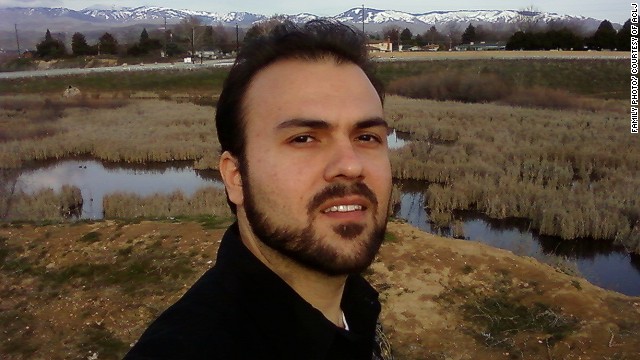Iran begins trial for U.S. pastor held since September
On Monday, American Saeed Abedini appeared in an Iranian court. The Christian pastor gave the judge a written statement and was questioned by prosecutors and his defense lawyer, whom he only met Monday.
But apparently that is not the end of the legal proceedings, according to his wife and lawyers who are assisting her with the situation.
Naghmeh Abedini said “a few” laymen with the Christian church in Iran told her husband’s attorney that they have been called to testify in the case, in which the pastor is being tried for his religious beliefs. The lawyer indicated that neither he nor the pastor were expecting to be allowed to attend Tuesday’s hearing.
Tiffany Barrans, the legal director for the American Center for Law and Justice, said the church leaders in Iran were faced with a dilemma: They could avoid being witnesses, or they could testify in court and possibly face similar charges.
“They are all very fearful to have to show up,” she said on a conference call with Nahgmeh Abedini and Jordan Sekulow, executive director of the nonprofit organization, which provides legal counsel and litigates cases involving freedom and liberty issues around the world.
Nahgmeh Abedini said that when she last spoke with her husband on January 9, he was resigned to a fate of remaining in prison.
“He sounded OK,” she said. “He sounded tired. He said he had come to a realization that they would not be releasing him anytime soon. Up until Christmas he had had hope.”
Saeed Abedini has been arrested nearly 10 times in the past by the Iranian authorities, his wife said. The last time he had been held was in 2009, when he agreed to stop supporting home churches.
He had taken nine trips to Iran, where he was born and where his parents live, since then.
His wife said he felt like he was OK to go back repeatedly because he had no dealings with the authorities since he promised to no longer work with Christian home services.
Once he even went with his wife and two children. He and Naghmeh are both converts to Christianity from Islam, and they received threats during the most recent family visit so she took the children home. He came back to their home in Boise, Idaho, later.
Last summer, the pastor was on a bus that was crossing from Turkey into Iran. Immigration officials took away his passport and he was later put on house arrest. In September he was jailed, in the notorious Evin prison, while he awaited trial.
On Monday, the Iranian state-run news agency INSA reported he would soon be released on bail, but his wife said the court had rejected the family’s attempt to pay.
She and her lawyers said the bail was $116,000, and the court rejected it on a technicality.
“His family (in Iran) has been running in circles to pay his bail and each time the court has rejected them and ask for more documents,” she said. “For us its like they are crying wolf.”
Her attorneys said the Iranian court is trying to gain positive worldwide media attention.
“The judge in this case has to portray it as if this is going to be a fair trial,” Barrans said.
INSA also reported the trial was finished in one session, something Naghmeh Abedini doesn’t believe.
Barrans said her team notified U.S. officials of the latest developments, but the State Department failed to respond.
Last week a spokeswoman for the department told reporters: “We understand that a hearing will be held soon, and we call on Iranian officials to respect Iran’s own laws and provide Mr. Abedini access to an attorney.”
Naghmeh Abedini said she remained hopeful even though her husband’s lawyer told her to be prepared for a conviction and sentence next week.
“I have a lot of peace and faith that it’s all going to work out in its time,” she said.
But she added that she sleeps only two hours a day, and her mind is constantly running through all the possibilities of what could happen to her husband.
She believes he has been tortured in prison, and it’s possible that the judge could sentence her husband to death for a capital crime.
She also worried about her children, ages 4 and 6, who haven’t seen their father in eight months. Dad was the one who gave them their baths at night, who read to them and sang them to sleep.
Now, they tell their mother they have a hard time remembering his face, so they put DVDs in and watch him as he played with them as babies.
“Every day is like 100 years to them,” she said. “They are in great emotional pain.”
She has only spoken to their father a few times since he was imprisoned. He is allowed to make short calls to his parents every Wednesday.
Naghmeh sounds strained. She comes back several times to her wish.
“There should be an outcry from the world that his religious freedom … is being taken from him. And they should free him right now based on their own laws that (they) have signed on to and agreed to.”
Saeed Abedini isn’t the only American being held at Evin prison. Amir Hekmati, a former U.S. Marine and decorated Iraq war veteran, is imprisoned in Iran on espionage charges.
Within weeks of setting foot in Iran for the first time in August 2011 to visit his grandmother, he was arrested, interrogated and imprisoned.
Months later he appeared on Iranian TV, showcased as a confessed CIA operative. The State Department has denied Hekmati was spying for the U.S. government and called the case a gross miscarriage of justice. A court convicted Hekmati of espionage, sentencing him to death, but he has since been granted a retrial.
Eric Ferrell contributed to this report

